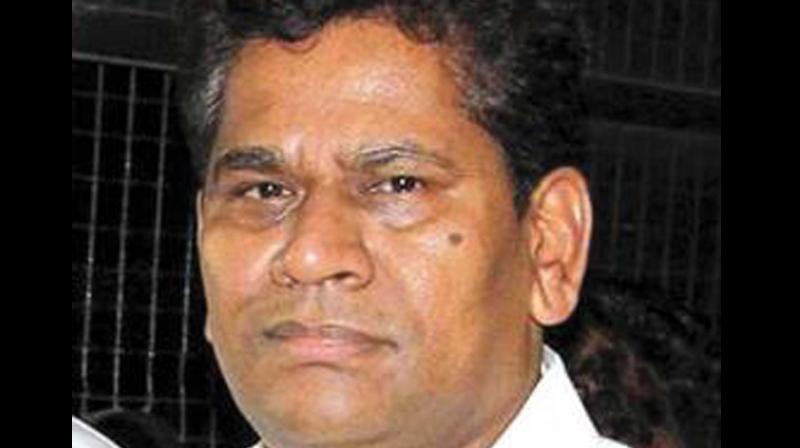Santiago Martin bleeds Mizoram, enters Kerala
It is this CAG report that finance minister Dr T.M. Thomas Isaac will use as ammunition against Mizoram lottery's entry to the state.

THIRUVANANTHAPURAM: The Mizoram government naming Teesta Distributors as promoters of Mizoram lottery in Kerala, in a letter received by the Chief Secretary on Saturday, is nothing short of a scandal. It was only in December 2016 that the Comptroller and Auditor General had detailed how Santiago Martin’s company violated all existing lottery rules and regulations to defraud Mizoram Government of crores of rupees. It is this CAG report that finance minister Dr T.M. Thomas Isaac will use as ammunition against Mizoram lottery’s entry to the state.
Here is a statistic that could give a hint of the shocking pilferage indulged in by Martin’s Teesta: The total sales proceeds from the sale of lotteries in Mizoram increased from Rs 2,972.19 crore in 2013-14 to Rs 6,571.70 crore in 2014-15, an increase of Rs 3,600 crore. But the revenue to Mizoram Government increased only by Rs 2.48 crore (from Rs 9.30 crore to Rs 11.78 crore) in the same period.
Profits unlimited
The embezzlement of public funds to such a degree was achieved with the collusion of Mizoram government itself. The government’s agreement with Teesta for the sale of its lottery tickets was a flagrant violation of Lottery (Regulations) Rules, 1998. Under the Rules, the entire proceeds of the sale of lottery tickets, as received from the distributors, should be credited to the Consolidated Fund of the organising state. But under the Mizoram-Teesta agreement, the distributor was required to deposit only a Minimum Guaranteed Revenue (MGR) into the Consolidated Fund.
This meant that the revenue to the state was effectively capped and the profits of the distributor limitless. Result: During the period 2012-15, the revenue to Mizoram government by way of MGR and administrative expenses was Rs 25.45 crore when the total sale proceeds were Rs 11,834.22 crore. “This system has resulted into substantial loss of revenue to the Government and large financial benefits to the distributors,” the CAG report had said. Intriguingly, it was found that Teesta had violated even their illegal deal with Mizoram. The distributor had to deposit the MGR on the seventh day of every succeeding month. But Teesta, the CAG revealed, had at times delayed depositing the MGR by even three years. The agreement did not have any penal provision either, allowing Teesta to illegally hold public money in its hands and use it profitably with impunity.
Illusion of prize money
Lottery prizes looked almost fictitious. Under the Lottery Regulation Rules, it is the responsibility of the organising sate to ensure that the prize money is credited to the bank accounts of prize winners. However, it was found that bulk of the prizes distributed was below Rs 10,000, and in a clear violation of Rules, were paid by the distributors. The Mizoram state had control over the distribution of only the prize money above Rs 10,000. During the period 2012-15, the total prize pay-out for prizes above Rs 10,000 was Rs 23.77 crore, just 0.25 percent of total prize pay-out of Rs 9,460.58 crore. In other words, 99.75 per cent of the prize pay-out was in cash and through the distributors. It was also not clear whether prizes had been paid because Teesta had not maintained details of prize winners such as names, addresses, prize amounts for prizes up to Rs 10,000.
Multiple draws
The Regulation Act stipulates that no lottery should have more than one draw a week. But Teesta had a set of weekly lottery schemes that ran every day of the week. The scheme names were designed by suffixing or prefixing sub-names for each day of the week to the lottery group name. Take Mumbailaxmi Weekly for instance. It has draws each day of the week: Mumbailaxmi Ram Monday, Mumbailaxmi Shankar Tuesday, Mumbailaxmi Seeta Wednesday, Mumbailaxmi Chand Thursday, Mumbailaxmi Suraj Friday, Mumbailaxmi Raja Saturday, Mumbailaxmi Rani Sunday.
Too many tickets seemed to have prompted Teesta to compromise on its security features. Rules insist that lottery tickets should have security features like bar code, micro-lettering, and penetrating ink for numbering to protect the interests of the ticket holder. In yet another instance of collusion, the Mizoram Government had not even insisted on inclusion of bar codes in the lottery tickets though provided for in the agreement. Further, thanks to Santiago Martin's shenanigans, Mizoram’s Lotteries Directorate has been diminished into a namesake body. The printed lottery tickets were distributed directly to the distributors, a violation of the clause that the tickets should first be despatched to the Directorate. What’s more, in yet another violation of Rules, Teesta never returned unsold tickets to the Directorate.

